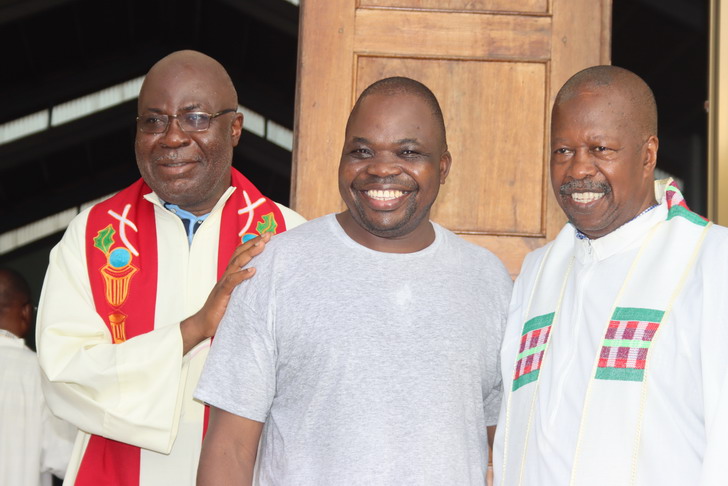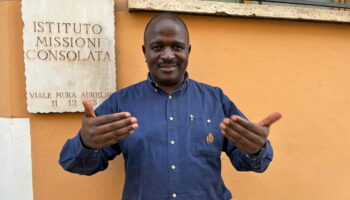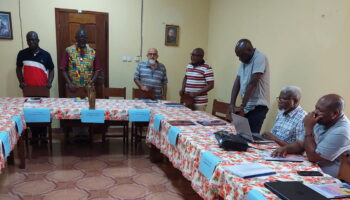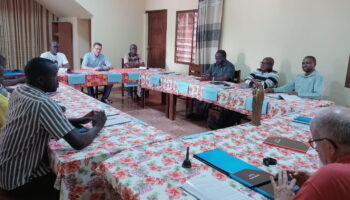
Evaluate and program the mission ad gentes for the next six years. This was the main objective of the XII Regional Conference of the Consolata Missionaries in Tanzania. The meeting took place from the 2nd to the 9th of February 2024 at Consolata Mission Centre Bunju in Dar es Salaam.
By Fr. Paulino Madeje *
The conference was attended by 35 missionaries from different communities with the presence of the Superior General, Father James Lengarin, the General Councillor for Africa, Father Erasto Mgalama, and the General Administrator, Father Fredrick Agalo.
The reflections were guided by the Acts of XIV General Chapter (XIVGC), the Continental Missionary Project (CMP) and the Post XIV General Chapter Continental Document (PXIVGCCAD).
Prior to the given activity, an inquiry was carried out in order to create an Instrumentum Laboris that served as a guiding document. For such an evaluation, four commissions corresponding to the named dimensions were created, which in turn, shared an enriching and at the same time a challenging experience. The dimensions were: Basic Formation, Ongoing Formation, Evangelization and Promotion of the Missionary Spirit and Economy for the Mission.
Formation
From Basic Formation, some positive news such as an increase in the number of youth that want to join our Institute were shared. This is a good news, and at the same time a challenging one due to lack of sufficient space to accommodate more of them. For such challenges, the Conference proposed a Formation Plan that contemplates the availability of qualified formators, formation fund, collaboration with all missionaries in terms of economic sustainability, construction of a new Philosophical Seminary etc.
The Ongoing Formation enumerated a list of some achievements. For instance, some missionaries have received the ongoing formation course (Bunju, Sagana, Italy) as part of the Institute’s plan. Additionally, sufficient materials were provided and some talks were given regarding the Biennio of the Person. On the other hand, it emerged out that cultural insertion is still a problem to some missionaries. Furthermore, concerning missionaries who are facing some life challenges, it was pointed out that there is a lack of a clear plan concerning programs and experts meant to help them.

About the mentioned and some other challenges pertaining to this dimension, the Conference adhered to the plan proposed by the CG XIII looking on how to concretize it. Some of the matters that need special attention are such as community life, the importance of language to new missionaries, accompaniment of missionaries in need and to particular groups according to their years of religious profession or priesthood.
Mission ad gentes
The Evangelization realm disclosed that there is a dedication and apostolic zeal shown by some missionaries in ad gentes activities. However, it was assessed that in the last six years we have not opened any ad gentes presence (without entering into detail concerning the new forms of the expression). On the contrary, we have handed one ad gentes parish (Tosamaganga) to the Diocese of Iringa, and Sanza parish, significant ad gentes presence is in the process to be given to the Diocese of Singida.
Responding to this inquiry, the Conference came up with the proposal of opening a new ad gentes presence in the next six years. Furthermore, it suggested the twining of parishes so that economically stable parishes can support the needy ones. Similarly, consolation activities such as those offered by the Ikonda Hospital are invaluable, and therefore, there is the need to continue maintaining their services. The contribution of the lay people is important in our evangelization, and hence, the need to form and involve them in our mission ad gentes. As local benefactors, they can be of great help.
The Administration
The Economy for the Mission unveiled some optimistic as well as challenging reality. The encouraging ones are: communities are capable of meeting the needs of missionaries (e.g. vacation, health, etc.). Additionally, each missionary has a Health Insurance that can cater for his medical expenses even outside Tanzania (at least in East Africa). Likewise, the 5% of the tithe and offerings has been given to the Institute. Nonetheless, this should not be a barrier of contributing more to assist the houses of formation, especially in assessing the generosity that some of our communities showed over the last six years.

In the next six years, the Conference gave a priority to the following ad gentes activities to be carried out: Formation, knowledge and application of the Directory of Administration, Sustainability strategies, investments and care of our heritage. In addition, it encouraged an accurate preparation and execution of the Mission Projects, preparation of missionaries in the administrative field, implementation of the common fund principle at every level such as free donations from benefactors, stipend from religious services, 5% from projects, Fund raising, and adoptions of seminarians by parishes, groups and individuals. Moreover, the contributions from various IMC institutions in order to cater for the daily running of the Region are important.
To enhance transparency and accountability, the Conference proposed that the Administration needs to work as a team at all levels, giving progressive reports on matters concerning administration and promote frequent internal audit to see how missions and institutions are performing.
Finally, communities under the IMC pastoral care must have two bank accounts: one for the IMC community and the other for the Parish. At the same time, there must be two different account entries: one for IMC and the other for the parish.
Other issues
Other issues dealt about during the Conference were such as Missionary Animation and Vocational Promotion, Missionary in the Community and those that pertain Peace, Justice and Integrity of Creation (PJIC). A critical look at the former revealed that the animation commission must have a clear, defined plan and a concrete program of activities and should share it with all missionaries in the Region.
Regarding missionary life, the Conference declared that for obligation each community should have a clear Community Project of Life in which some concrete activities are outlined. This enables its members to materialize some proposals such as prayer, pastoral activities, ongoing formation, fraternal correction, etc.

Regarding JPIC issues, the Conference proposed that matters such as gender violence, child abuse, self-abuse through varieties of addictions, human trafficking, paralegal issues in small Christian community level, discouraging corruption in all its forms, reconciliation especially family-to-family and person to person to be shared and dealt about at the continental level. In addition, missionaries are invited to use the mass media (like Enendeni Magazine) to educate and disseminate information on such issues.
We thank the Consolata family for their tireless efforts to make sure that the message of Consolation is spread to the whole world. The fulfilment of the proposals raised by this Conference requires a synodal approach to mission. Let’s learn to work and walk together.
* Fr. Paulino Madeje, IMC, is the director of Enendeni magazine.



